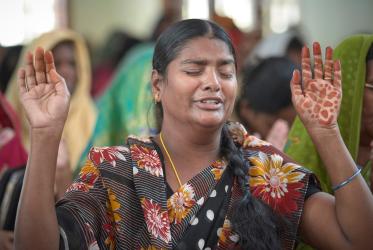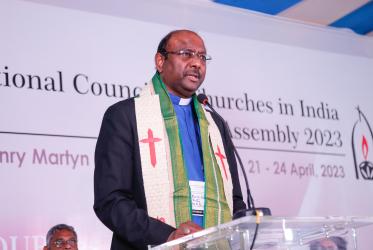Syrische Mar-Thoma-Kirche von Malabar
Note about membership:
Distribution:
India: 963,470
Asia (outside India): 25,000
Europe: 1,300
Middle East: 38,800
North America: 33,370
The origins of the Mar Thoma Syrian Church of Malabar go back to the work of the Apostle St Thomas in the south-west region of India. According to the tradition Saint Thomas came to India in 52 AD and founded the church there. In the 16th century, when the Portuguese established their power on the west coast of India, they forced the church they found there to accept the jurisdiction of the pope in Rome. But in 1653 the church declared itself independent again. In the following period close links developed with the Church of Antioch. This explains the reference to "Syrian" in the names of several churches in India, especially in the state of Kerala, which trace their history back to these common roots.
At the beginning of the 19th century the Syrian church came into contact with British missionaries, who established educational institutions and assisted the church with theological formation. The Bible was translated into the local language, Malayalam, in 1828. In 1836 a group of committed Christians initiated a movement of reformation in the church. They insisted on re-ordering its life and practice in the light of the scriptures. The reformed section of the church became known as the Mar Thoma Syrian Church of Malabar or simply the Mar Thoma Church. Institutions such as the Mar Thoma Evangelistic Association (1888) and the Mar Thoma Theological Seminary (1927) were created and continue to promote evangelical and ecumenical vision and commitment.
While retaining many of the traditional characteristics of the ancient Eastern church, the Mar Thoma Church keeps very close relations with Christian churches in other parts of the world. It is in full communion with the churches of the Anglican Communion and maintains special relations with the Episcopal Church in the USA and the Anglican churches in Australia and Canada, as well as with the Uniting Church in Australia. In India, the Joint Council of the Church of North India, the Church of South India and the Mar Thoma Church has been renamed as the Communion of Churches in India (2000) as a further step towards visible unity. The Mar Thoma Church is fully involved in the ecumenical movement and stands for active cooperation with other churches, as for example in the Nilackal Ecumenical Trust in Kerala.
Awake to missionary responsibility, the Mar Thoma Church is engaged in evangelism, education, technical training and medical work. It participates actively in the society. Its members form one of the most literate communities in the country and contribute to the social and cultural advancement of the nation. The church maintains good relations with Hindus, Muslims and other religious groups. Issues like poverty, unemployment, injustice and violence have been taken up seriously for study and action. The church has a particular concern for the Dalits and other marginalized groups and is working for their empowerment. It runs orphanages, homes for the destitute and hospices and schools for physically and mentally handicapped persons as well as for the blind and the deaf. New ventures are palliative and pain care, care for senior citizens, tribal children, drug addicts and programmes dealing with HIV/AIDS. These programmes are mainly supported by resources coming from the members of the church.




